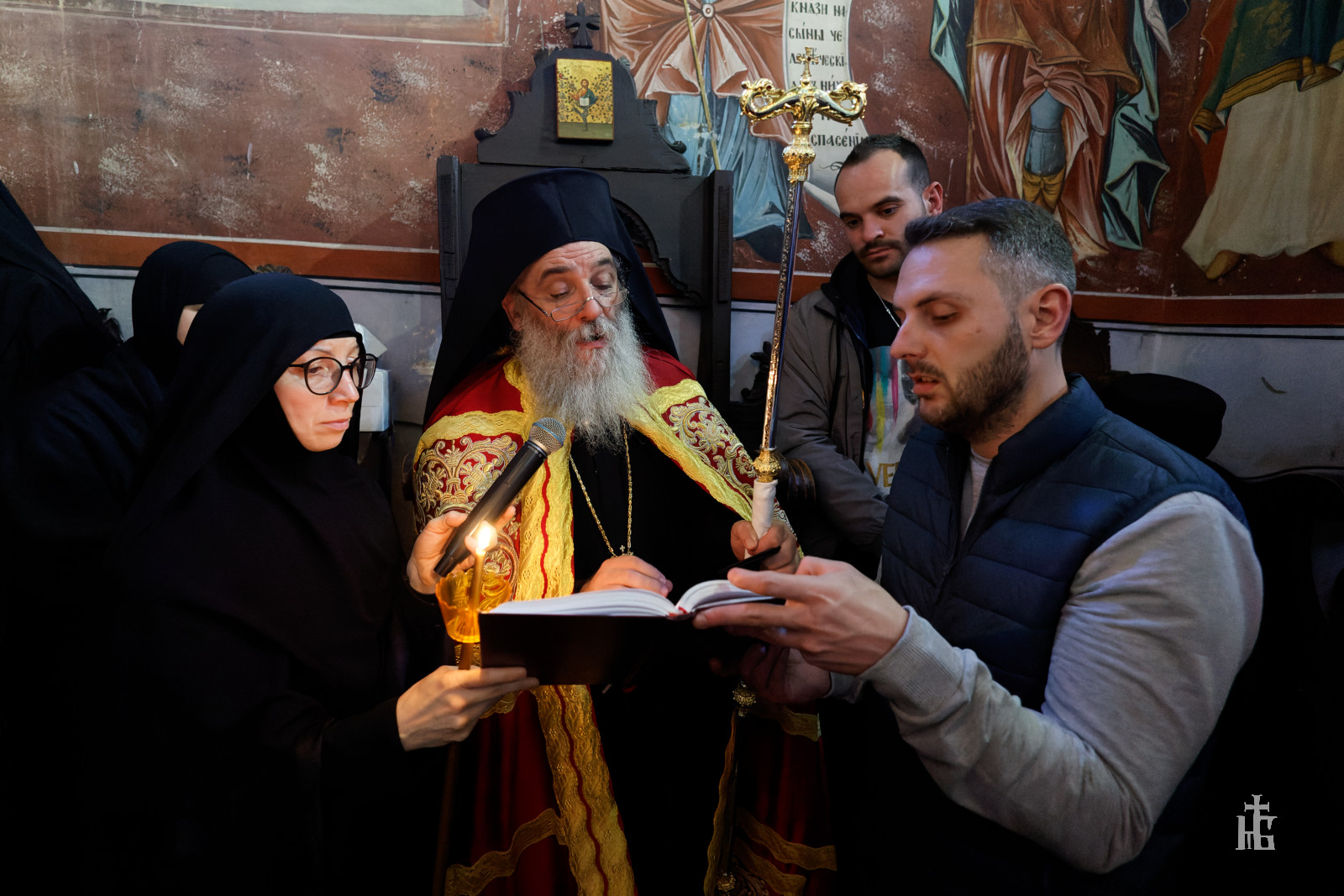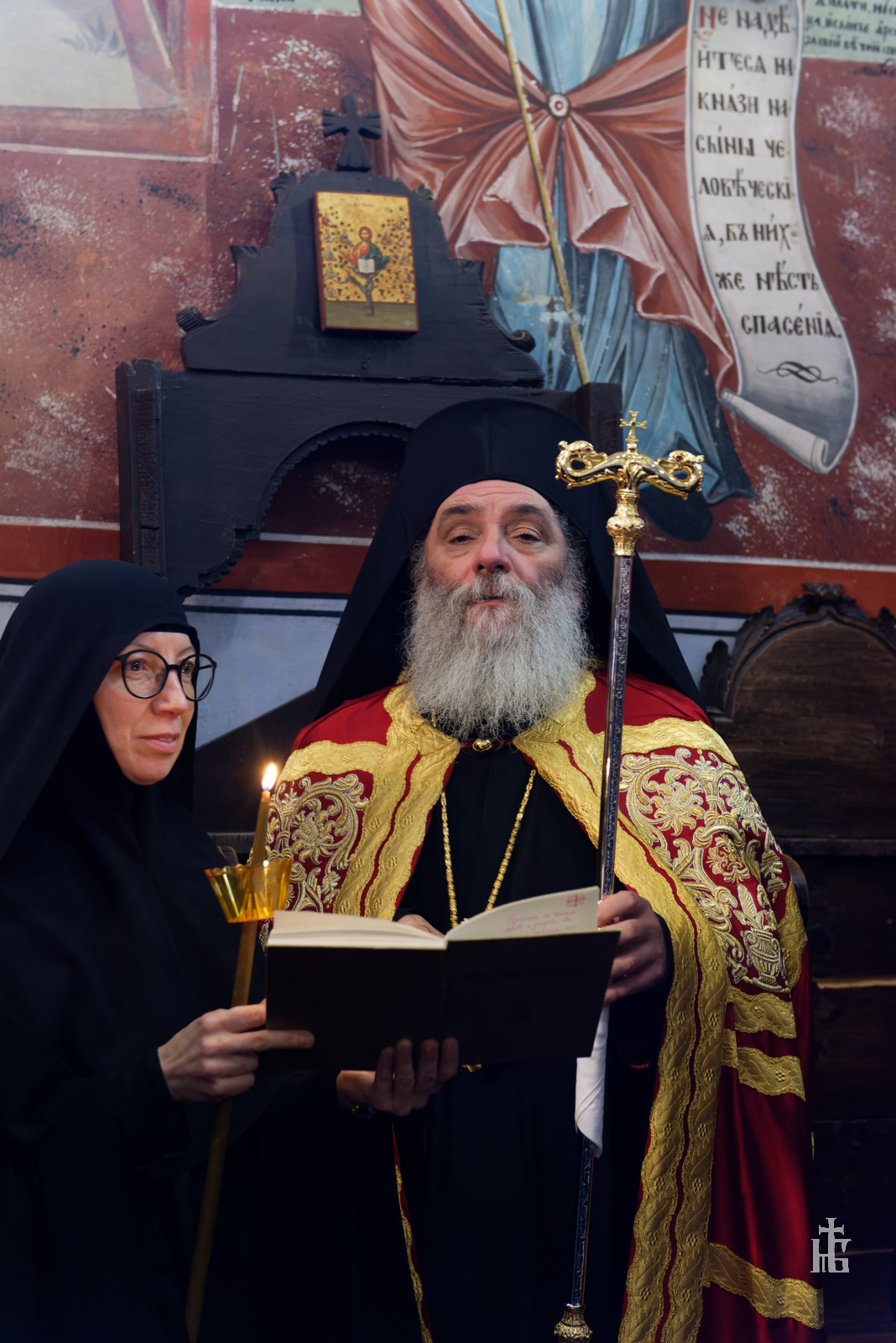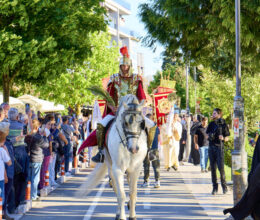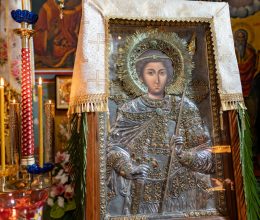Homily of His Grace, Bishop Parthenius of Antania, delivered at the Vespers in honor of the Great Martyr Saint George the Trophy-Bearer at the Monastery Metochion in Rajčica, on May 5, 2023
Honorable Fathers,
Dear brothers and sisters in monasticism, beloved faithful,
First of all, I want to extend my gratitude to Archimandrites Father Matej and Father Cheruvim from the Church of Greece, who made such a sacrifice to travel here so that together we could celebrate the great witness of Christ—Saint George the Great Martyr and Trophy-Bearer. Our celebration of his memory will last for three days, beginning tonight and culminating in Struga with the traditional procession through the city, carrying his sacred relics and wonderworking icon.
I believe that all of us here tonight felt deeply moved when Father Cheruvim, with his beautiful voice, so touchingly sang the hymn appointed to be chanted once more this evening at the conclusion of the Sunday of the Myrrh-Bearing Women. As you know, according to the Paschal calendar, this past week was dedicated to the Myrrh-bearing Women, as well as to Joseph of Arimathea and Nicodemus—the key figures who performed the sacred burial of Christ. Perhaps some of you remember that on Great Friday, during the Vespers service commemorating the burial of Christ, when the Holy Shroud bearing the Body of the Lord is solemnly carried out from the altar and placed in the beautifully adorned epitaphios, a wondrous hymn is sung, composed in the fifth tone of Byzantine chant. In this lyrical hymn, the Church’s hymnographer places moving words into the mouths of Joseph and Nicodemus, as if they are speaking directly to Christ during His burial.
This evening, when Father Cheruvim chanted that hymn with such love and reverence, it transported me back to the atmosphere of that majestic and sacred day—Great Friday—a day when awesome, great, and glorious events unfolded for our salvation. These events are mystically connected not only with all the saints but with each of us personally. For without Great Friday, there would be no Resurrection. Now, allow me to read this hymn, which for centuries has moved the Church of God and which was translated into Macedonian by the recently reposed Father Jovan Takovski:
“You, who clothe Yourself with light as with a garment,
Joseph with Nicodemus took down from the Tree.
Seeing You lifeless, naked, and unburied,
they wept from the depths of their hearts and, lamenting, said:
‘Woe is me, O sweetest Jesus!
Seeing You on the Cross, even the sun wrapped itself in darkness,
and the earth trembled with fear, and the veil of the temple was torn asunder.
And now I behold You, who accepted death for my sake—
How shall I bury You, my God?
With what linen shall I wrap Your incorruptible body?
With what hands shall I touch Your pure flesh?
What hymn shall I sing at Your departure, O Compassionate One?
I glorify Your sufferings; I praise Your burial and Resurrection, crying aloud:
‘Glory to You, O Lord!’”
Today, the Church reminds us once more of these trembling words from Great Friday, of the Myrrh-bearing Women, of Joseph and Nicodemus, who performed the sacred task of Christ’s burial. But above all, the Church calls us to remember the boundless love and goodness of God—the sacrifice the Son and Word of God endured for us, His sufferings, and ultimately His Resurrection, all for the sake of our salvation.

Tonight, we celebrate a great athlete of Christ, one who has earned the title of Great Martyr and Trophy-Bearer from the Church—Saint George. He is a peerless witness to both the Cross and the Resurrection of Christ. In truth, all saints, dear ones, are witnesses to the Cross and the Resurrection. All of them, bearing the cross of ascetic struggle, voluntary deprivation, and suffering, have become partakers in the Cross of Christ and thus also in His Resurrection. Likewise, each of us here tonight bears our own life’s cross; we all endure suffering in some measure throughout our lives. Our Lord Jesus Christ addresses all of us in His Gospel, saying: “In the world you will have tribulation; but be of good cheer, I have overcome the world” (John 16:33).
Just as Christ conquered the world, so too are we called to overcome the trials we encounter. His saints, especially the martyrs like Saint George, exemplify this victory. They bore their crosses with courage and perseverance, and in doing so, they participated not only in Christ’s suffering but also in His triumph over death.
In the person of Saint George, we can clearly see the complete fulfillment of these words. Through his faith in the Resurrection, he drew upon its power, overcoming the world and the fear of death, and endured all torments with unwavering courage, boldly confessing Christ as God. His suffering became an example to many of the brutal spectators witnessing his tortures, so much so that many of them themselves became Christians—and later, martyrs. It is well known that the Romans, like other ancient civilizations, were hardened and cruel at heart, finding entertainment in watching the torture and execution of others. Yet, many of those onlookers were transformed by the grace that the risen Christ poured upon Saint George during his trials, and they embraced Christianity. Among them was none other than Empress Alexandra, the wife of Emperor Diocletian, one of the fiercest persecutors of Christians. Witnessing the suffering of the holy Great Martyr, his unwavering determination, and his love for Christ, she desired to accept Christ and be baptized, along with many of her servants and others present at the martyrdom. In the end, they too gloriously suffered for Christ, earning the crown of martyrdom.
Had it not been for the Resurrection and the faith in it, beloved, no one would have been willing to renounce their life in this world so radically. Faith in the Risen Christ—the mystical vision of His sweet and radiant countenance in the secret chamber of the heart and the longing for Him—gave Saint George the strength to renounce everything in this world. And what he renounced was no small thing. From his youth, he had been adorned with many military honors, crowned with glory, dignity, beauty, and wealth. Yet he regarded all of these things as nothing compared to his risen Lord, with whom he had cultivated a close relationship of prayer and love from his early childhood. His communion and friendship with Christ took place deep within his heart and mind, invisible to the eyes of the world.
Although Saint George was a Roman military tribune, no one knew that by faith and spirit he belonged to those whom the Roman Empire most hated and persecuted. However, during a public celebration of a military victory, when it was expected of him to offer sacrifices to the gods and bow before the idols, Saint George publicly confessed before the emperor and the people that he was a Christian.
And what a marvelous grace from the risen Lord! Although the emperor offered him many honors, riches, glory, and even proposed to make him his royal son-in-law, Saint George rejected all of it as worthless compared to “the surpassing knowledge of Christ Jesus, my Lord, for whose sake I have lost all things, and consider them rubbish, that I may gain Christ” (cf. Philippians 3:8). It was faith in the Resurrection that empowered him. That same faith is what sustains all of us to remain true Christians—if, of course, we desire and strive to be so. Therefore, let us cast away everything that draws us away from Christ, for only He can make us truly happy and whole in the fullest sense of the word. To be a true Christian, one must first become a human being according to Christ’s measure. Only someone who lives and acts through Him, with Him, and in Him can be called a true human being in the divine sense.
Tragically, we witness today that in a world without Christ, human aspirations are no longer directed upward toward the age to come, but regress instead toward cruelty, indifference, and dehumanization. The world is shrouded in darkness. Christian ideals have been trampled upon, and moral values abandoned. And what, after all, are these moral values—the principles of freedom and respect for others—even secular moralists uphold, though they may not believe in God? These, undoubtedly, are Christian principles, gifts from those enlightened by Christ to the world. Before Christ’s coming, we could hardly speak of universal moral values. There were only tribal customs and norms. Some tribes, for instance, were cannibals, for whom eating others was considered moral. For others, it was normal to live in debauchery, to find amusement in killing, or to revel in cruelty and bloodshed.
Into such a fallen and spiritually rotten world, Christ came and created a new one. His warm and exalted teaching established lasting and universal moral values, acceptable to all. Above all, He created the warm refuge of love, empathy, and freedom—the family—as a sacred mystery of love, trust, and self-sacrifice between one man and one woman. Thus was born the new Christian world. And even more profoundly, Christ established the angelic life on earth, embraced by countless monks over these two millennia.

Today’s honored saint, the Victorious Saint George, stands among the martyrs of Christ—those who bore witness to Him and inherited eternal life by offering the most precious thing they possessed: their own blood and their lives. These martyrs knew that it is not this earthly life but eternal life that is our ultimate destination, for eternity is our true state of being, where we exist in glory and rejoicing. Monastics, too, with their martyr-like conscience, bear witness to Christ with their spiritual blood. There is a well-known saying from the holy ascetics: “Give blood and receive the Spirit.”
Beloved, all of us—both monastics and laity—are called to bear witness to the crucified and risen Christ. To bear witness, however, we must first cultivate a true relationship of love with Him, seeing Him as a father, a brother, and the greatest benefactor to whom we owe everything, since our very lives are gifts from Him. Everything He gives us is out of His boundless love. Even when we stray from Him, when we sin and forget Him, He remains with us, ready to help. How beneficial it is for a person to live with gratitude for all that the God-Man has done for us! This evening’s hymn reminded us of Good Friday, of the Son of God’s sacrificial death on the cross. Yet the Church does not remind us of these sacred and saving events only tonight but continually throughout our lives. This is why the Church has ordained fasting every Wednesday and Friday—so we may always remember the betrayal, suffering, and crucifixion of Christ, lest, God forbid, we find ourselves among those who betrayed and crucified Him. If we remember these saving events and Christ’s sacrificial love not only once a year during Holy Week but throughout the year, we will surely become better people. Conversely, our fasting on Wednesdays and Fridays will be in vain if we remain insensitive and merciless toward others. Unfortunately, this lack of compassion is something we often witness even within the Church.
As Father Cherubim sang the beautiful hymn from Good Friday, we remembered the Holy Tomb, that empty tomb which gives life. We also remembered how humanity responded to God—how the creature crucified its Creator. It is a truly incomprehensible and shocking reality. Even the learned men of that time, with all their knowledge of God and His Word, could not comprehend how God could become man and suffer at the hands of His own creation—how the Son of God could be crucified by human beings. This is why the Apostle Paul says, “We preach Christ crucified: a stumbling block to Jews and foolishness to Gentiles, but to those whom God has called, both Jews and Greeks, Christ the power of God and the wisdom of God” (1 Corinthians 1:23-24). Christ is the One who saved humanity, the only new thing under the sun. And He is the only one in history with countless witnesses, from the time of His Resurrection to this very day. One of the greatest among these witnesses is our beloved Saint George, honored by both East and West, venerated in many sanctuaries, including here at this holy monastery in Rajchica.
I thank you all once again for coming to this monastery, which is itself a miracle of Saint George. Perhaps it is worth reminding you—since people often forget, and some may not even know—what this monastery looked like just over twenty years ago. It was entirely forgotten and neglected. No one would even enter it. The guesthouse was little more than a half-ruined stable made of mud bricks. Yet, through the blessing and powerful intercession of Saint George, and through the efforts and dedication of these spiritual heroes—the nuns, who bear witness to Christ with their spiritual blood—the monastery was rebuilt and restored from its very foundations. And now we all see it standing renewed and glorified.
Let us, beloved, take Saint George the Great Martyr as our example and strive, above all, to become better people. This is what we need most. And only after that can we truly become good Christians.
Christ is Risen!















